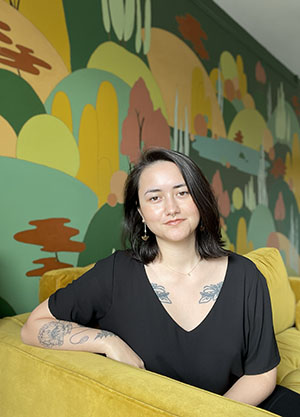Unbalance: L'Amour Lisik interviews Courtney Baird-Lew

Managing Editor L'Amour Lisik talks with Courtney Baird-Lew, whose short story “Absence” appears in our summer issue #227. They discuss memories as foundation for a story, non-linear career paths, and belonging to two cultures while not quite belonging to either.
Courtney Baird-Lew is a writer and editor based in Montréal, QC. She is a graduate of Concordia University’s Communication Studies and Creative Writing programs and was longlisted for the CBC Short Story Prize in 2023.
Your short story “Absence” serves as a meditation on grief and love, demonstrating the different ways one family reacts to the loss of a parent/child/partner. As a result, the main character, known only as the boy, experiences a range of reactions from the adults in his life—his mother retreats, his grandmother lashes out, and his grandfather reminisces. What inspired you to write this story, and what drew you to centring the young boy’s perspective?
The story was inspired by a handful of visits I made to my Chinese grandparents’ house as a child. Their place, and the (very) few details I could remember of it, served as the story’s foundation. What I do remember is a distinct feeling of tension—of unbalance—that always hung in the air when they were around. I didn’t have the ability to discern where the tension came from, but, like any kid who is told to listen and be attentive, I could sense that things were simmering below the surface. I wanted to explore this kind of observant naïveté through a new set of eyes during a time of heartache and to see how each character would react in relation to one another. I centred the story around a young boy—someone who would carry on the family name—to see how a traditional, masculine sense of duty would start to rear its head after the loss of the family patriarch.
Much of the story revolves around what’s unsaid, though one line from the grandfather goes against that when he tells the boy, “[Your grandmother] thinks that you don’t like our food. Because your mom is not like us.” Can you talk about diaspora and belonging in relation to this story and/or to your own life?
I wanted to have one line/statement directed at the boy that underlined his grandparents' (or at least his grandmother’s) definitive stance toward race; to showcase this “us versus them” mentality. While I find that this hard-line viewpoint is generally softened by each new generation, I wanted to illustrate how elders, especially in minority/diasporic communities, still do look at mixed family members as diluted versions of what they are “supposed” to be. As one of the first people in my family lineage to be half-Chinese rather than full, the awareness of belonging to two cultures—while not quite belonging to either—is something I wanted to illustrate.
“Absence,” with its references to VHS box sets and landline phones, transports the reader back a few decades. The scene of the grandfather and the boy eating late-night instant noodles while watching infomercials has a particular sheen of nostalgia for me. What led you to set the story in this era?
I’m glad that the nostalgia was felt! The story was definitely steeped in my childhood memories. Apart from this very ‘90s sensibility, though, I wanted to ground the story in a time and place where media was analogue. Movies are on videotape. The one house phone is connected by a cord. You only have a limited number of channels to choose from, half of which are news broadcasts. I wanted to ensure that the characters had to “sit” with each other without too many technological distractions.
You also work as a copywriter, content creator, and editor. Does your literary writing inform your content creation and vice versa, or are they separate practices for you? Do you have any advice for people who are seeking careers as editors and copyeditors?
Everything I write or create is always informed by my literary (or what I’ll call my “personal”) writing, and vice versa. My copywriting mind loves being given a compact word count on a tight deadline. Piecing together the ideal words or phrase(s) to convey an exact message in a precise amount of space, sometimes with a hint of humour or alliteration, is incredibly satisfying—so much so that I have trouble writing longer stories now (cue my six-page-long piece in this issue).
To answer the second part of your question, while I am no expert in charting a course towards a career in editing or copyediting, my personal experience is that there is always someone who knows someone who knows someone working on an interesting project and who needs a second pair of eyes. Much of my editing work has come from friend, acquaintance, or colleague recommendations. It can be quite a competitive field and it’s easy to feel dejected—especially if you’re sending out job applications to major publishing houses or other literary entities. My simple (and very basic) advice is to remember that career paths aren’t always linear. Sometimes they zigzag, and that’s perfectly fine.
What are you reading and/or writing right now? Are there any particular authors who inspire you?
I just finished reading In Exile, the debut memoir/investigative nonfiction book by journalist Sadiya Ansari, which I thought was incredibly powerful. And while I’m a little late to the party on this one, I also just finished the 2023 The Best American Short Stories edited by Min Jin Lee, which I found to be one of the best selections yet for the annual collection.
As for authors who have inspired me recently, Tsering Yangzom Lama (We Measure the Earth with Our Bodies) and Jonathan Escoffery (If I Survive You) are the top contenders. As for “old” and somewhat clichéd go-to favourites to get myself out of writing ruts, we have Carver, Didion, García Márquez (specifically A Very Old Man with Enormous Wings), Cormac McCarthy (specifically The Road), Svetlana Alexievich, Ta-Nehisi Coates, Colson Whitehead, the first few, phenomenal pages of The Corrections, and Pinter plays for the dialogue (and sense of doom).

L'Amour Lisik









